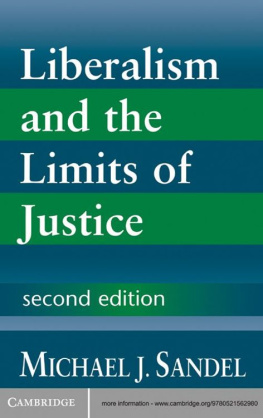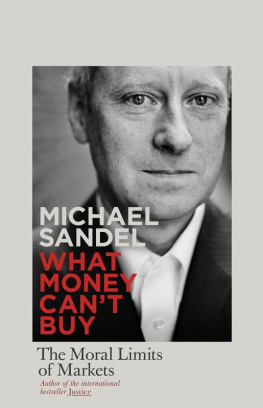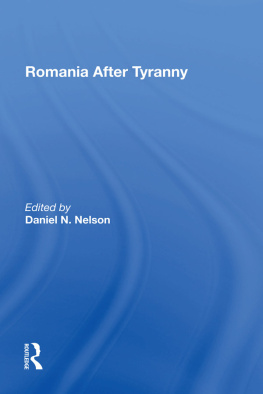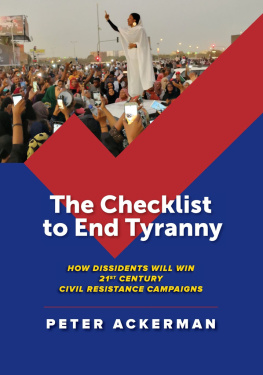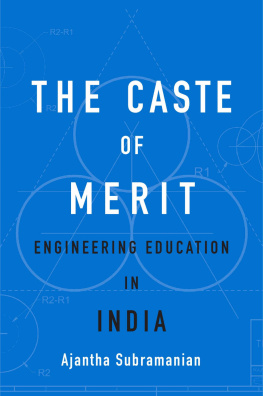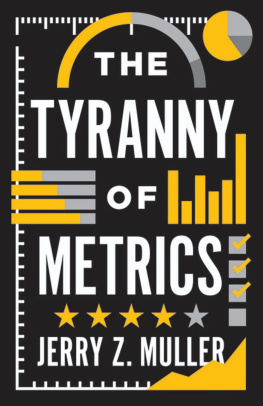Michael J. Sandel - The Tyranny of Merit
Here you can read online Michael J. Sandel - The Tyranny of Merit full text of the book (entire story) in english for free. Download pdf and epub, get meaning, cover and reviews about this ebook. publisher: Farrar, Straus and Giroux, genre: Politics. Description of the work, (preface) as well as reviews are available. Best literature library LitArk.com created for fans of good reading and offers a wide selection of genres:
Romance novel
Science fiction
Adventure
Detective
Science
History
Home and family
Prose
Art
Politics
Computer
Non-fiction
Religion
Business
Children
Humor
Choose a favorite category and find really read worthwhile books. Enjoy immersion in the world of imagination, feel the emotions of the characters or learn something new for yourself, make an fascinating discovery.

- Book:The Tyranny of Merit
- Author:
- Publisher:Farrar, Straus and Giroux
- Genre:
- Rating:5 / 5
- Favourites:Add to favourites
- Your mark:
- 100
- 1
- 2
- 3
- 4
- 5
The Tyranny of Merit: summary, description and annotation
We offer to read an annotation, description, summary or preface (depends on what the author of the book "The Tyranny of Merit" wrote himself). If you haven't found the necessary information about the book — write in the comments, we will try to find it.
The Tyranny of Merit — read online for free the complete book (whole text) full work
Below is the text of the book, divided by pages. System saving the place of the last page read, allows you to conveniently read the book "The Tyranny of Merit" online for free, without having to search again every time where you left off. Put a bookmark, and you can go to the page where you finished reading at any time.
Font size:
Interval:
Bookmark:
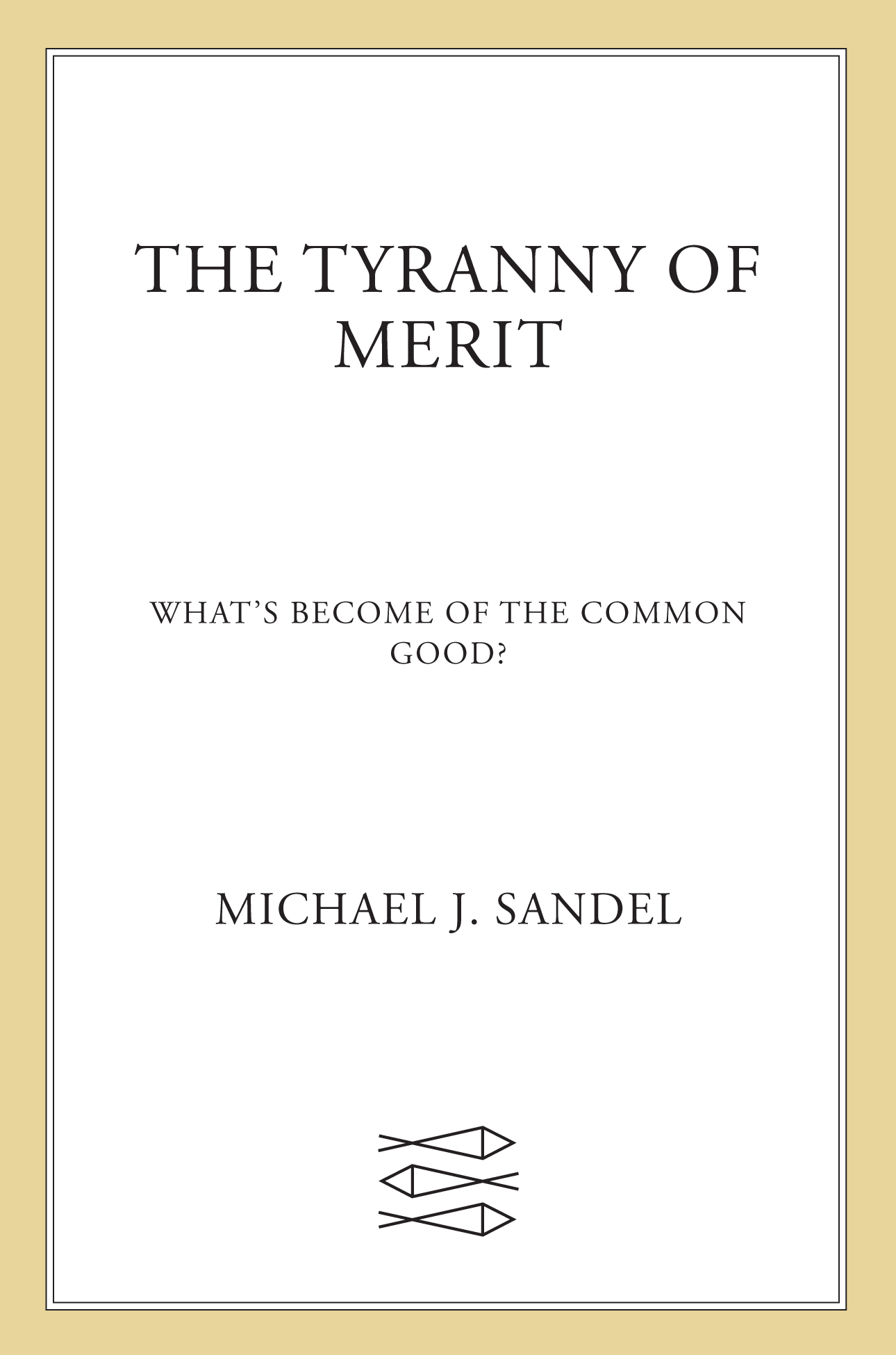

The author and publisher have provided this e-book to you for your personal use only. You may not make this e-book publicly available in any way. Copyright infringement is against the law. If you believe the copy of this e-book you are reading infringes on the authors copyright, please notify the publisher at: us.macmillanusa.com/piracy.
For Kiku, with love
When the coronavirus pandemic hit in 2020, the United States, like many other countries, was unprepared. Despite warnings the previous year from public health experts about the risk of a global viral contagion, and even as China contended with its outbreak in January, the United States lacked the ability to conduct the widespread testing that might have contained the disease. As the contagion spread, the wealthiest country in the world found itself unable to provide even the medical masks and other protective gear that doctors and nurses needed to treat the flood of infected patients. Hospitals and state governments found themselves bidding against one another to acquire testing kits and life-saving ventilators.
This lack of preparedness had multiple sources. President Donald Trump, ignoring the warnings of public health advisors, downplayed the crisis for several crucial weeks, insisting in late February, We have it very much under control We have done an incredible job Its going to disappear.
But beyond its lack of logistical preparedness, the country was not morally prepared for the pandemic. The years leading up to the crisis were a time of deep divisionseconomic, cultural, political. Decades of rising inequality and cultural resentment had brought an angry populist backlash in 2016, resulting in the election of Trump, who, shortly after having been impeached but not removed from office, found himself presiding over the gravest crisis the country had faced since the terrorist attacks of September 11, 2001. The partisan divide persisted as the crisis unfolded. Few Republicans (only 7 percent) trusted the news media to provide reliable information on coronavirus; few Democrats (4 percent) trusted the information Trump provided.
Amid the partisan rancor and mistrust came a plague that demanded the kind of solidarity few societies can summon except in times of war. People throughout the world were implored, and in many cases required, to observe social distancing, to abandon work and stay at home. Those unable to work remotely faced lost wages and disappearing jobs. The virus posed the greatest threat to those of advanced age, but could also infect the young, and even those who could ride it out had parents and grandparents to worry about.
Morally, the pandemic reminded us of our vulnerability, of our mutual dependence: We are all in this together. Public officials and advertisers reached instinctively for this slogan. But the solidarity it evoked was a solidarity of fear, a fear of contagion that demanded social distancing. The public health required that we express our solidarity, our shared vulnerability, by keeping our distance, by observing the strictures of self-isolation.
The coincidence of solidarity and separation made sense in the context of a pandemic. Apart from the heroic health care providers and first responders whose help for the afflicted required their physical presence, and the cashiers in grocery stores and the delivery workers who risked their health bringing food and supplies to those sheltering at home, most of us were told that the best way to protect others was by keeping our distance from them.
But the moral paradox of solidarity through separation highlighted a certain hollowness in the assurance that We are all in this together. It did not describe a sense of community embodied in an ongoing practice of mutual obligation and shared sacrifice. To the contrary, it appeared on the scene at a time of nearly unprecedented inequality and partisan rancor. The same market-driven globalization project that had left the United States without access to the domestic production of surgical masks and medications had deprived a great many working people of well-paying jobs and social esteem.
Meanwhile, those who reaped the economic bounty of global markets, supply chains, and capital flows had come to rely less and less on their fellow citizens, as producers and as consumers. Their economic prospects and identities were no longer dependent on local or national communities. As the winners of globalization pulled away from the losers, they practiced their own kind of social distancing.
The political divide that mattered, the winners explained, was no longer left versus right but open versus closed. In an open world, success depends on education, on equipping yourself to compete and win in a global economy. This means that national governments must ensure that everyone has an equal chance to get the education on which success depends. But it also means that those who land on top come to believe that they deserve their success. And, if opportunities are truly equal, it means that those who are left behind deserve their fate as well.
This way of thinking about success makes it hard to believe that we are all in this together. It invites the winners to consider their success their own doing and the losers to feel that those on top look down with disdain. It helps explain why those left behind by globalization would become angry and resentful, and why they would be drawn to authoritarian populists who rail against elites and promise to reassert national borders with a vengeance.
Now, it is these political figures, wary though they are of scientific expertise and global cooperation, who must contend with the pandemic. It will not be easy. Mobilizing to confront the global public health crisis we face requires not only medical and scientific expertise, but also moral and political renewal.
The toxic mix of hubris and resentment that propelled Trump to power is not a likely source of the solidarity we need now. Any hope of renewing our moral and civic life depends on understanding how, over the past four decades, our social bonds and respect for one another came unraveled. This book seeks to explain how this happened, and to consider how we might find our way to a politics of the common good.
April 2020
Brookline, Massachusetts
GETTING IN
In March 2019, as high school students awaited the results of their college applications, federal prosecutors made a stunning announcement. They charged thirty-three wealthy parents with engaging in an elaborate cheating scheme to get their children admitted to elite universities, including Yale, Stanford, Georgetown, and the University of Southern California.
At the heart of the scam was an unscrupulous college-counseling consultant named William Singer, who ran a business that catered to anxious, affluent parents. Singers company specialized in gaming the intensely competitive college admissions system that had in recent decades become the primary gateway to prosperity and prestige. For students lacking the stellar academic credentials top colleges required, Singer devised corrupt workaroundspaying proctors of standardized tests such as the SAT and ACT to boost students scores by correcting their answer sheets, and bribing coaches to designate applicants as recruited athletes, even if the students did not play the sport. He even provided fake athletic credentials, photoshopping applicants faces onto action photos of real athletes.
Font size:
Interval:
Bookmark:
Similar books «The Tyranny of Merit»
Look at similar books to The Tyranny of Merit. We have selected literature similar in name and meaning in the hope of providing readers with more options to find new, interesting, not yet read works.
Discussion, reviews of the book The Tyranny of Merit and just readers' own opinions. Leave your comments, write what you think about the work, its meaning or the main characters. Specify what exactly you liked and what you didn't like, and why you think so.

